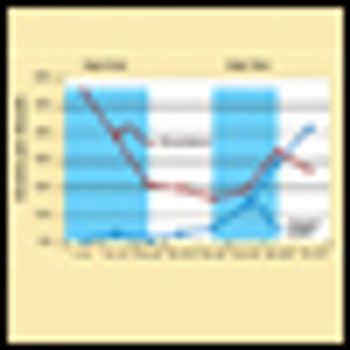
Patients with papillary thyroid cancer typically undergo a triad of consecutive initial treatments, comprising surgery, radioiodine therapy, and thyroid hormone suppression of serum thyrotropin (thyroid-stimulating hormone, or TSH).

Your AI-Trained Oncology Knowledge Connection!


Patients with papillary thyroid cancer typically undergo a triad of consecutive initial treatments, comprising surgery, radioiodine therapy, and thyroid hormone suppression of serum thyrotropin (thyroid-stimulating hormone, or TSH).

Differentiated thyroid cancer, the most common endocrine malignancy, can touch the lives of young and old individuals. It is generally associated with a normal lifespan whether it is completely eradicated or held in check with judicious medical interventions.

There is uniform agreement that initial treatment of high-risk thyroid cancer should include total thyroidectomy, compartmental neck dissection of clinically involved cervical lymph nodes, and radioactive iodine (RAI) remnant ablation.

Low-risk papillary thyroid carcinoma (PTC), by definition, requires careful balancing of the risks of treatment and the risks of the disease.

Music is a powerful tool that can evoke latent emotions, induce a range of emotional states, and enhance communication. It also offers a creative, lyrical, and symbolic means of addressing spiritual needs, and is increasingly used in end-of-life care.

Crawford and Hou[1] review the data on luteinizing hormone-releasing hormone (LHRH) antagonists in prostate cancer. They describe the results of a phase III trial comparing monthly degarelix to monthly leuprolide in men with advanced prostate cancer. Degarelix treatment was associated with a more rapid decline of serum testosterone, and was not associated with an initial surge of serum testosterone seen during the first few days of treatment with leuprolide. They discuss the role of this new form of medical gonadal suppression for the treatment of prostate cancer.

The recent US Food and Drug Administration (FDA) approval of degarelix, a luteinizing hormone-releasing hormone (LHRH) antagonist, has renewed interest in this class of drugs as a prostate cancer therapy. Approval was based on a prospective phase III trial of 610 patients randomized to one of two dosing schedules of degarelix, or standard-of-care monthly leuprolide acetate monotherapy, with initial antiandrogen therapy allowed at the treating physician’s discretion for prevention of clinical flare.[1]

Drs. Crawford and Hou provide an important clinical introduction to a novel class of hormonal agents that have been under development for several decades for the treatment of advanced and metastatic prostate cancer.

Physicians have known since 1941 that testosterone suppression benefits patients with symptomatic metastatic prostate cancer.[1] The pioneering study in this regard showed that estrogen therapy achieved comparable efficacy to castration by improving acid and alkaline phosphatase levels associated with relief of cancer-related symptoms. More than 6 decades later, however, many of the therapies subsequently developed for achieving androgen deprivation still suffer from serious limitations.

An international, multi-institutional study presented at the 2009 Annual Meeting of the American Society of Clinical Oncology (ASCO), held May 29–June 2 in Orlando, Fla, found that use of pemetrexed (Alimta) as maintenance therapy following standard treatment improves overall survival for patients with advanced non–small-cell lung cancer (NSCLC); the study also further confirmed that this benefit is primarily limited to those with the nonsquamous subtype (abstract CRA8000).

Two new studies reported at this year’s ASCO meeting demonstrated the effect of a new class of targeted therapy called poly (ADP-ribose) polymerase (PARP) inhibitors on traditionally difficult-to-treat breast cancers-so-called “triple-negative” breast cancer and BRCA1/2-deficient breast cancers.

An 8-year randomized, controlled phase III clinical study has shown that a patient-specific therapeutic vaccine, BiovaxID, significantly prolongs disease-free survival in follicular non-Hodgkin’s lymphoma. The study, featured in ASCO’s plenary session, found that patients who received the vaccine experienced a median disease-free survival of approximately 44 months compared to approximately 30 months for those who received a control vaccine-an increase of 47% (abstract P2).

Preliminary findings from a phase III, multicenter trial show that adding a novel cancer vaccine-called gp100:209-217(210M) peptide-to standard therapy doubles response rates and extends progression-free survival in patients with metastatic melanoma, without causing significant side effects (abstract CRA9011).

Many women have turned to natural forms of hormone replacement for menopause since learning that conventional hormone replacement therapy (HRT) may increase their risks of breast cancer and other health problems. Most women have assumed that “natural” or “bioidentical” HRT is safer than conventional HRT. However, recent research has shown that this is not the case and that, in fact, the risks are probably similar.

Ferring Pharmaceuticals announced the launch of a phase IIIB clinical trial of degarelix for injection, a new injectable gonadotropin-releasing hormone (GnRH) receptor antagonist approved by the US Food and Drug Administration (FDA) for the treatment of hormone-sensitive advanced prostate cancer.

Agennix announced that talactoferrin alfa has been granted Fast Track designation by the FDA for the first-line treatment of renal cell carcinoma (RCC) in combination with sunitinib (Sutent).

The American Civil Liberties Union and the Public Patent Foundation at Benjamin N. Cardozo School of Law filed a lawsuit charging that patents on two human genes associated with breast and ovarian cancer stifle research that could lead to cures and limit women’s options regarding their medical care.

The addition of rituximab (Rituxan) to systemic chemotherapy has improved the response rates, progression-free survival, and overall survival of patients with newly diagnosed diffuse large B-cell lymphoma (DLBCL) compared to chemotherapy alone. In the front-line setting, the use of rituximab is changing the biology and clinical behavior in DLBCL patients who fail to respond or relapse following chemoimmunotherapy.

Chemoimmunotherapy has been the most significant step in recent years to improving overall survival (OS) and progression-free survival (PFS) rates in patients with diffuse large B-cell lymphoma (DLBCL).[1] Despite this major therapeutic advance, a significant proportion of patients will relapse or remain refractory to initial chemoimmunotherapy. The pivotal PARMA trial confirmed the place of high-dose chemotherapy and autologous stem cell transplant (ASCT) as the optimum salvage treatment.

Drs. Hernandez-Ilizaliturri and Czuczman should be complimented on their comprehensive review of management options for patients with relapsed and refractory diffuse large B-cell lymphoma (DLBCL).